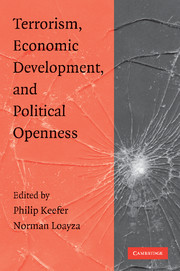Book contents
- Frontmatter
- Contents
- List of Tables
- List of Figures
- Contributors
- Overview: Terrorism, Economic Development, and Political Openness
- PART ONE THE COSTS OF TERRORISM
- 1 Economic Consequences of Terrorism in Developed and Developing Countries: An Overview
- 2 The Costs of Responding to the Terrorist Threats: The U.S. Case
- PART TWO DEVELOPMENT, DEMOCRACY, AND THE ORIGINS OF TERRORISM
- PART THREE THE ORIGINS OF TERRORISTS
- Appendix
- Index
- References
1 - Economic Consequences of Terrorism in Developed and Developing Countries: An Overview
Published online by Cambridge University Press: 06 July 2010
- Frontmatter
- Contents
- List of Tables
- List of Figures
- Contributors
- Overview: Terrorism, Economic Development, and Political Openness
- PART ONE THE COSTS OF TERRORISM
- 1 Economic Consequences of Terrorism in Developed and Developing Countries: An Overview
- 2 The Costs of Responding to the Terrorist Threats: The U.S. Case
- PART TWO DEVELOPMENT, DEMOCRACY, AND THE ORIGINS OF TERRORISM
- PART THREE THE ORIGINS OF TERRORISTS
- Appendix
- Index
- References
Summary
Terrorism is the premeditated use or threat of use of violence by individuals or subnational groups to obtain a political or social objective through the intimidation of a large audience, beyond that of the immediate victim. Although the motives of terrorists may differ, their actions follow a standard pattern, with terrorist incidents assuming a variety of forms: airplane hijackings, kidnappings, assassinations, threats, bombings, and suicide attacks. Terrorist attacks are intended to apply sufficient pressures on a government so that it grants political concessions. If a besieged government views the anticipated costs of future terrorist actions as greater than the costs of conceding to terrorist demands, then the government will grant some accommodation. Thus, a rational terrorist organization can, in principle, achieve some of its goals more quickly if it is able to augment the consequences of its campaign. These consequences can assume many forms, including casualties, destroyed buildings, a heightened anxiety level, and myriad economic costs. Clearly, the attacks on September 11, 2001, (henceforth, 9/11) had significant costs that have been estimated to be in the range of $80 to $90 billion when subsequent economic losses in lost wages, workman's compensation, and reduced commerce are included (Kunreuther et al. 2003). The cumulative costs of 9/11 were a small percentage of U.S. gross domestic product (GDP), which exceeded $10 trillion.
- Type
- Chapter
- Information
- Terrorism, Economic Development, and Political Openness , pp. 17 - 47Publisher: Cambridge University PressPrint publication year: 2008
References
- 95
- Cited by



